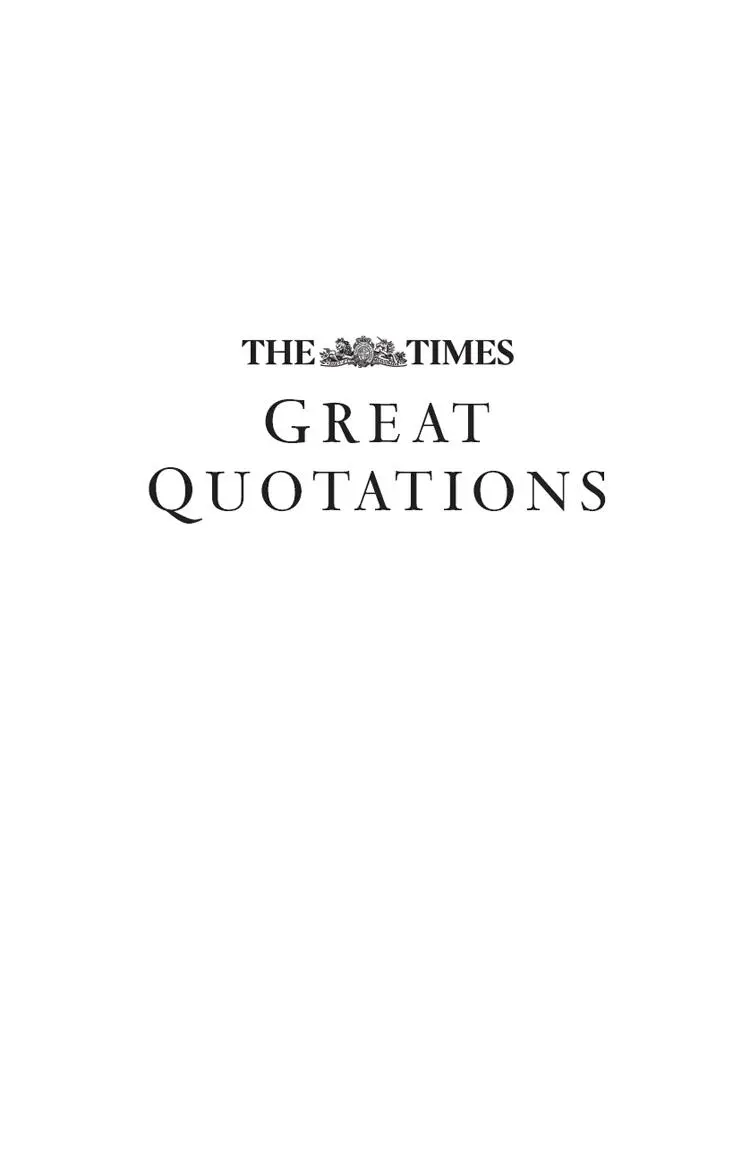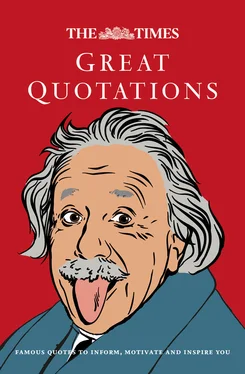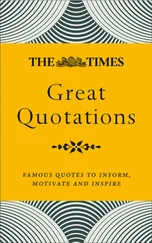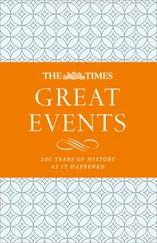James Owen - The Times Great Quotations - Famous quotes to inform, motivate and inspire
Здесь есть возможность читать онлайн «James Owen - The Times Great Quotations - Famous quotes to inform, motivate and inspire» — ознакомительный отрывок электронной книги совершенно бесплатно, а после прочтения отрывка купить полную версию. В некоторых случаях можно слушать аудио, скачать через торрент в формате fb2 и присутствует краткое содержание. Жанр: unrecognised, на русском языке. Описание произведения, (предисловие) а так же отзывы посетителей доступны на портале библиотеки ЛибКат.
- Название:The Times Great Quotations: Famous quotes to inform, motivate and inspire
- Автор:
- Жанр:
- Год:неизвестен
- ISBN:нет данных
- Рейтинг книги:5 / 5. Голосов: 1
-
Избранное:Добавить в избранное
- Отзывы:
-
Ваша оценка:
- 100
- 1
- 2
- 3
- 4
- 5
The Times Great Quotations: Famous quotes to inform, motivate and inspire: краткое содержание, описание и аннотация
Предлагаем к чтению аннотацию, описание, краткое содержание или предисловие (зависит от того, что написал сам автор книги «The Times Great Quotations: Famous quotes to inform, motivate and inspire»). Если вы не нашли необходимую информацию о книге — напишите в комментариях, мы постараемся отыскать её.
The Times Great Quotations: Famous quotes to inform, motivate and inspire — читать онлайн ознакомительный отрывок
Ниже представлен текст книги, разбитый по страницам. Система сохранения места последней прочитанной страницы, позволяет с удобством читать онлайн бесплатно книгу «The Times Great Quotations: Famous quotes to inform, motivate and inspire», без необходимости каждый раз заново искать на чём Вы остановились. Поставьте закладку, и сможете в любой момент перейти на страницу, на которой закончили чтение.
Интервал:
Закладка:

COPYRIGHT
Published by Times Books
An imprint of HarperCollins Publishers
Westerhill Road
Bishopbriggs
Glasgow G64 2QT
www.harpercollins.co.uk
timesbooks.co.uk
First edition 2018
© This compilation Times Newspapers Ltd 2018
The Times® is a registered trademark of Times Newspapers Ltd
All rights reserved under International and Pan-American Copyright Conventions. By payment of the required fees, you have been granted the non-exclusive, non-transferable right to access and read the text of this e-book on screen. No part of this text may be reproduced, transmitted, downloaded, decompiled, reverse engineered, or stored in or introduced into any information storage and retrieval system, in any form or by any means, whether electronic or mechanical, now known or hereinafter invented, without the express written permission of HarperCollins.
The contents of this publication are believed correct at the time of printing. Nevertheless the publisher can accept no responsibility for errors or omissions, changes in the detail given or for any expense or loss thereby caused.
A catalogue record for this book is available from the British Library.
Cover image © Bettmann / Getty
My thanks and acknowledgements go to Lily Cox and Robin Ashton at News Syndication and, in particular, at The Times, Ian Brunskill and, at HarperCollins, Gerry Breslin, Jethro Lennox, Karen Midgley, Kerry Ferguson, Sarah Woods and Evelyn Sword.
eBook Edition © November 2018
ISBN 9780008317263
Version: 2018-10-13
CONTENTS
Cover
Title Page
Copyright
Introduction
Achievement and success
Acting and drama
Actions and behaviour
Advice and principles
Appetites
Aspiration and opportunity
Beliefs and doubt
Challenge and tenacity
Chance
Change
Christmas and festive spirit
Competition
Conflict and aggression
Courage and daring
Creativity and the arts
Death and sorrow
Economics and commerce
Education
Emotions
Experience and age
Freedom and tolerance
Friendship
Fun and humour
Good and bad
Governance and society
Gratitude and tribute
Happiness and torment
Health and wellbeing
History and the past
Hope
Intelligence and ideas
Judgment and worth
Leadership
Life, or the way of the world
Love and marriage
Mankind and civilisation
Men
Mistakes and failings
Money and wealth
Morals and ethics
Music
Nature and the weather
Parents and children
Politics and power
Science and technology
Seeing and appearance
Sport and motivation
Temperament and character
The future
Time and the present
Thought and understanding
Travel and relaxation
Truth
Virtue
Wisdom and folly
Wit and insight
Women
Words and writers
Work and employment
People index
About the Publisher
INTRODUCTION
“A good newspaper,” said the writer Arthur Miller, “is a nation talking to itself.” Being a good newspaper, The Times strives to be exactly that ideal. Being intelligent, too, it realised some years ago that one way to promote that end was to make use of the words of interesting people talking to others. As a consequence, in the Daily Universal Register section of every edition, next to the birthdays, the anniversaries and the plashings of voles, there began to appear a stimulating quotation or saying of note, of which this volume is a selection.
Because the quotes which have appeared in the newspaper were assembled on random lines, this is not intended to be a traditional, comprehensive dictionary of famous quotations as such, though I hope it is nevertheless a valuable work of reference. Rather, the content has been grouped into common themes. Again, the hope is that, taken together in this way, these insights, musings and witty observations will provide food for thought. Those readers who wish to find quotes from specific people can easily do so by consulting the index at the back of the book.
Winston Churchill, the originator of a memorable line or two himself, believed it “a good thing for an uneducated man to read books of quotations”. He may have been playing up his own inattentiveness as a schoolboy, but what can the rest of us gain from a ramble through the thoughts of greater minds? One thing is that they do think alike. Over the centuries, the same subjects and reflections recur, for after all much is constant in the human race. Often, too, even the words are similar, and at certain times in history seem to occur to people almost simultaneously. Was it William Faulkner or André Gide who said something about not being able to swim for new horizons without losing sight of the shore?
And, besides being treated to some world-class lectures in the essentials of philosophy, politics, success and common sense, there is the satisfaction (and surprise) of discovering how many expressions that we use every day are actually quotations. Who first said he was going from the sublime to the ridiculous? Napoleon, while leaving Russia. Who held that hell could be paved with good resolutions (often misquoted as good intentions)? That was Mark Twain. And was it a logistics company or the polar explorer Fridtjof Nansen who advised that the difficult takes a little time, the impossible a little longer?
Similarly, it is good to be reminded of the proper context of phrases often cited without knowledge of to what they refer. Making the pips squeak, a favourite standby of politicians, initially had nothing to do with taxing the rich. It was coined in 1918 with regard to the scale of German reparations for the First World War.
When Stanley Baldwin talked of newspapers having “power without responsibility”, he was himself quoting his cousin Rudyard Kipling, and when his successor as prime minister returned from Germany holding in his hand “peace with honour”, he was referencing a remark of his mid-19th century predecessor, Lord John Russell.
In the preparation of the text, every effort has been made to attribute correctly the quotations chosen. Their sources have been given where they are known to be contemporaneous with or authored by the speaker. Where it might be helpful, an English translation is given from a foreign language.
Remembrance of Things Past? Nothing to do with Proust originally, it comes from a Shakespeare sonnet. Fools rush in; hope springs eternal; to err is human; even that Cup Final favourite sing-song about death’s sting – all 18th century poet Alexander Pope. Let us salute Samuel Johnson as a compiler of dictionaries, but I can’t agree with him that making – and reading – them is “dull work”.
James Owen
ACHIEVEMENT AND SUCCESS
He who does something at the head of one regiment, will eclipse him who does nothing at the head of a hundred.
[Letter, 1861]
Abraham Lincoln, 16th president of the US (1809–1865)
•
Those who believe that they are exclusively in the right are generally those who achieve something.
Proper Studies (1927)
Aldous Huxley, English writer and philosopher (1894–1963)
•
Concentrate all of your thoughts upon the work at hand. The sun’s rays do not burn until brought to a focus.
Alexander Graham Bell, Scottish-born scientist and inventor (1847–1922)
Читать дальшеИнтервал:
Закладка:
Похожие книги на «The Times Great Quotations: Famous quotes to inform, motivate and inspire»
Представляем Вашему вниманию похожие книги на «The Times Great Quotations: Famous quotes to inform, motivate and inspire» списком для выбора. Мы отобрали схожую по названию и смыслу литературу в надежде предоставить читателям больше вариантов отыскать новые, интересные, ещё непрочитанные произведения.
Обсуждение, отзывы о книге «The Times Great Quotations: Famous quotes to inform, motivate and inspire» и просто собственные мнения читателей. Оставьте ваши комментарии, напишите, что Вы думаете о произведении, его смысле или главных героях. Укажите что конкретно понравилось, а что нет, и почему Вы так считаете.












